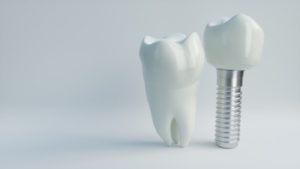4 Factors That Influence the Cost of Dental Implants
September 4, 2022

When it comes to replacing missing teeth, dental implants are the name of the game! They’re known for being able to perfectly mimic natural teeth in terms of look, feel, and functionality—and if cared for properly, they can last for virtually a lifetime. So, if you have missing teeth that you’re looking to replace, implants should be one of your top considerations. That said, you might have a few questions about the price tag for such an incredible treatment option. Here are four factors that often contribute towards the cost of dental implants.
1. Number of Implants Needed
Naturally, the more teeth you’re missing, the more implants you’re going to need—which will inevitably affect the total cost of treatment. If you only have one or two missing teeth, your bill shouldn’t run too high. But if you have multiple lost teeth or an entire row missing, you’ll be faced with a steeper bill. In these instances, it might be worth weighing other tooth replacement options like dentures or bridges. Even though they aren’t as durable or lasting as implants, these solutions can still effectively replace missing teeth, and often at a lower initial cost.
2. Location of Implants & Placement Procedures
Believe it or not, it’s actually more expensive to replace missing front teeth than missing back teeth. This is because your dentist needs to ensure that the solution carefully matches the angle of your jawline, so that your bite pattern isn’t altered. Depending on the teeth being replaced and the complexity of the solution, your dentist might also have to utilize certain advanced technologies and placement methods to assist with the procedure, which can unsurprisingly affect the cost of treatment.
3. Additional Surgeries & Treatments
Sometimes a patient’s mouth isn’t able to successfully integrate dental implants without a little help first. In some cases, the jawbone isn’t able to support implants due to insufficient bone density; however, a supplemental bone graft can be performed to fortify the existing bone matter. In other cases, something like a tooth extraction or gum disease therapy might be necessary beforehand to ensure the future success of the implants. Any necessary additional surgeries or treatments will drive up your final bill, but in any case, the better your oral health is, the less likely you’ll need additional and costly treatment.
4. The Oral Surgeon’s Training & Expertise
The more highly trained and experienced your dental surgeon is, the more you may need to pay. The process of becoming an oral surgeon capable of placing implants is a long, arduous process that involves tons of additional training and certification. That said, the peace of mind gained by knowing you’re getting the best possible care is often worth the extra cost!
Knowing the factors that determine the cost of dental implants can help you make an informed decision about how to restore your smile! If you’re curious about receiving implants, don’t hesitate to speak with your dentist about your eligibility.
About the Author
An Idaho native himself, Dr. Brent Cline has proudly served patients and families in the Idaho Falls community for several years. Dr. Cline received his dental doctorate from Creighton University in Omaha and has taken countless hours of continuing education in a wide range of fields. His practice is pleased to offer a wide range of available services including dental implants. If you have any questions about dental implants or you’d like to arrange a visit, feel free to contact Dr. Cline through his practice’s website or by phone for assistance: (208) 529-0420.
No Comments
No comments yet.
RSS feed for comments on this post.
Sorry, the comment form is closed at this time.

